In diplomatic milestone, the US and China formally join Paris Climate Agreement
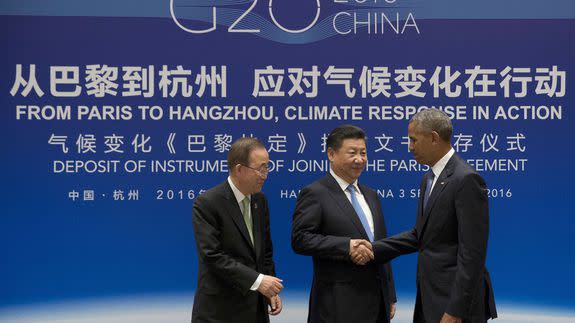
The United States and China, the world's two biggest emitters of greenhouse gases, formally joined the Paris Climate Agreement on Saturday.
U.S. President Barack Obama and Chinese President Xi Jinping officially committed their respective nations to the global climate pact during an early evening ceremony in Hangzhou, China,
The two leaders handed their official documents signifying their countries' actions to United Nations Secretary General Ban Ki-moon at the ceremony.
The joint actions mark the culmination of one of the most consequential partnerships of the Obama presidency, in which the two biggest emitters in the world have overcome decades of disagreements about global warming to catalyze action on the issue.
SEE ALSO: Paris Agreement on climate change could go into effect this year
The U.S.-China commitments makes it all the more likely that the agreement will go into effect by the end of 2016 — years earlier than world leaders and climate activists had initially expected when the pact was adopted in December 2015.
"We have a saying in America — that you need to put your money where your mouth is," Obama said at the ceremony. "And when it comes to combatting climate change, that’s what we’re doing, both the United States and China. We’re leading by example."
The Obama administration said the U.S. and China aimed to pressure other countries into formally joining the pact as soon as possible so that negotiators and policymakers could begin implementing strategies to reduce harmful emissions, develop clean energy and help communities adapt to human-caused global warming.
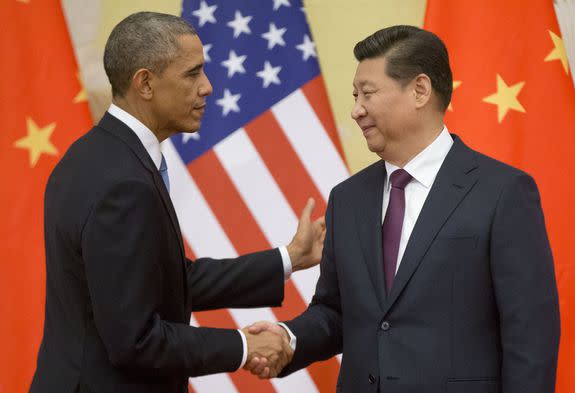
Image: AP Photo/Pablo Martinez Monsivais
"The signal of the two largest emitters taking this step together, and far earlier than people had expected, should give confidence to the global community — and to other countries working on their climate change plans — that they too can move quickly," Brian Deese, Obama's senior adviser, told reporters on a White House press call ahead of the ceremony.
Getting to '55'
Nearly 200 nations signed the Paris climate deal last winter during the United Nations climate conference in France.
The agreement aims to keep the rise in global temperatures to 2 degrees Celsius, or 3.6 degrees Fahrenheit, above preindustrial levels by 2100.
It also aims for countries to make efforts to keep warming to as low as 1.5 degrees Celsius (2.7 degrees Fahrenheit) above preindustrial levels by 2100.
The agreement for the first time commits all nations to taking actions to address global warming, though it doesn't mandate specific steps for each to take. Instead, countries have made their own commitments that, taken together, would reduce emissions enough to get the world partway toward the 2-degree Celsius target.
For example, the U.S. has pledged to cut its emissions by 26 to 28 percent below 2005 levels by 2025.
The pact won't technically enter into force until at least 55 countries, representing 55 percent of the world's total emissions, adopt domestic policies committing their governments to the agreement.
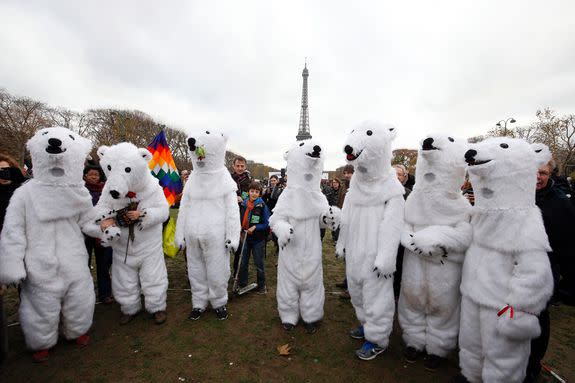
Image: FRANCOIS GUILLOT/AFP/Getty Images
Obama joined the U.S. through an executive agreement, which the U.S. Senate does not need to ratify. Instead, an agreement involves a legal assessment, a review by relevant federal agencies and finally the president's approval.
Before the U.S. and China joined on Saturday, 24 countries representing just 1.08 percent of total emissions had already formally signed on.
China represents about 20 percent of total global emissions, and the U.S. accounts for roughly 18 percent. That brings the count to 26 countries and nearly 40 percent of worldwide emissions. A handful of large economies — including South Korea, Brazil and Argentina — are on track to join this fall, Deese said.
Given such momentum, "Today’s announcement, coupled with other key countries signaling intentions to take similar action, all but assures the Paris Agreement will take effect this year," Alden Meyer, director of strategy and policy at the Union of Concerned Scientists, said in a statement.
The Trump card
The push to ratify the international agreement before the end of 2016 is in part a reaction to the tempestuous political climate in the United States, Mashable has previously reported.
Republican presidential nominee Donald Trump has pledged to "cancel" the Paris agreement if he is elected to the White House. While Trump couldn't nullify the actions of other countries, he could freeze actions being taken to align U.S. emissions with the goals of the agreement, complicating global efforts to avoid potentially catastrophic levels of global warming.
Asked if the Obama administration or Chinese leaders were concerned about such a possibility, Deese told reporters, "It's certainly a discussion that we have."
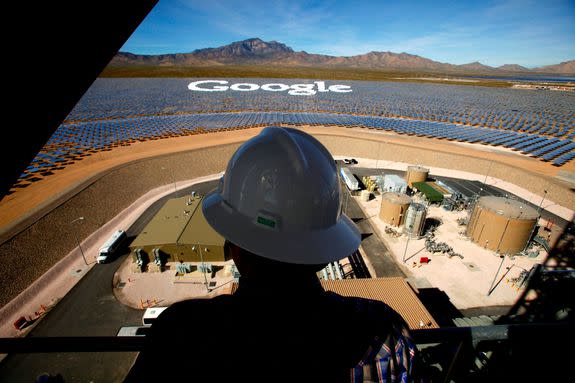
Image: Mark Boster/Los Angeles Times via Getty Images
He noted that the U.S. business community, the electric utility industry and private investors have broadly embraced the goals of the Paris agreement and recognize the need to drastically reduce greenhouse gas emissions.
"While there is obviously a very partisan political debate on this issue in some parts of the Republican party ... I think that progress in the business community and in the private sector and internationally is going to ultimately pull the United States in the direction of progress," Deese said.
U.S.-China teamwork
Obama and Xi's announcement Saturday is their latest effort taken to propel global climate action.
"Over the past few years, our joint leadership on climate has been one of the most significant drivers of global action," Obama said on Saturday.
The Obama administration in the past was reluctant to establish aggressive targets unless major competing economies like China followed suit. Chinese leaders long argued that the wealthiest nations — which have historically emitted the most carbon — should first commit to stricter standards.
"For decades, previously it was as if China and the United States were the captains of two opposing teams in a match of debating approaches to climate change," Deese said.
Obama and Xi teamed up on two other climate-related efforts during their Saturday meeting.
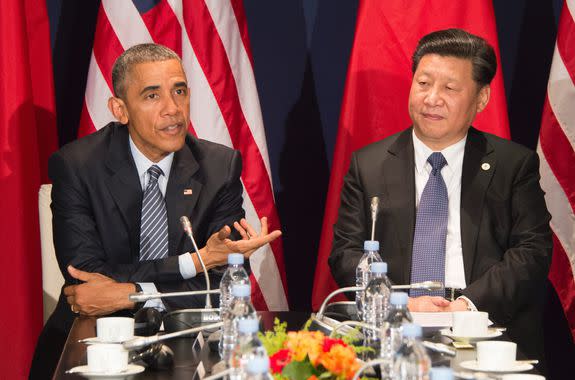
Image: JIM WATSON/AFP/Getty Images
The leaders jointly expressed their support for a global effort to slash international aviation emissions. The industry's governing body, the International Civil Aviation Organization, is considering adopting a voluntary, market-based measure to reduce emissions and spur investments in cleaner fuels and energy-efficient designs.
The U.S. and China, also the world's emitters of aviation emissions, said they expected to be early participants in the measure and would volunteer to join if the organization adopted one at its September assembly.
Obama and Xi on Saturday also agreed to work together to restrict the production and use of hydrofluorocarbons (HFCs), the super-polluting refrigerants that can be up to 10,000 times more potent on a per molecule basis than carbon dioxide when released into the atmosphere.
The two leaders said they would collaborate to achieve an "ambitious and comprehensive HFC amendment" to the Montreal Protocol, an international treaty to protect the ozone layer.
The amendment would include an "early" date for freezing HFC production with an "ambitious" schedule for phasing down its production and use, although the nations didn't specify by which year.
